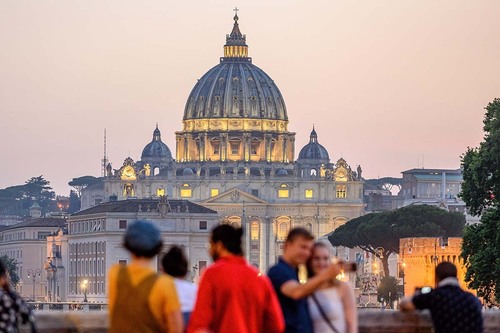
The University of Notre Dame’s Medieval Institute, Center for Italian Studies and Rome Global Gateway have co-sponsored three planning grants of up to $20,000 per award to support research projects in Rome and specifically the development of research networks. These grants are meant to engage Notre Dame faculty and graduate students with researchers working at a variety of institutions in Italy, especially in national, international and pontifical academies, universities, libraries, museums and archives based in Rome.
The first grant has been awarded to Denis Robichaud, the John and Patrice Kelly Associate Professor of Liberal Studies and director of PHYSIS, and his team, composed of Thérèse Scarpelli Cory, the John and Jean Oesterle Associate Professor of Thomistic Studies and director of the History of Philosophy Forum, and Robert Goulding, associate professor of liberal studies and director of the Reilly Center for Science, Technology and Values.
The grant will support a collaborative program titled PHYSIS Summer Convivium, a week-long advanced summer research seminar and a two-day public conference held at the Rome Global Gateway. Eight graduate students and eight researchers or faculty members, half from Notre Dame and half from Rome, will be invited to participate in the convivium, the first of which will take place in the summer of 2024 on the topic of Elements of Nature/Elements of Reasoning.
“A distinctive feature of premodern philosophy and science is the organization of nature, reasoning and methods into elements (στοιχεῖα),” explained Robichaud.
“On the one hand, countless thinkers from the pre-Socratics to medieval philosophers either reduced nature into a small number of elements (earth, water, air, fire and aether) or developed atomistic models, whether materialist or mathematical. On the other hand, philosophers, scientists and mathematicians in the premodern world also conceived of elements of reasoning as they developed axiomatic methods of demonstration and argumentation. These two threads in the premodern history of philosophy and science are often studied independently, but careful examination identifies commonalities and attempts to connect the phenomena.”
The second grant has been awarded to Claire Jones, the William Payden Associate Professor of German, for a project titled The Ritual Cultures of Medieval Religious Women.
Jones’ project will also be developed in a three-year time frame that will include research time in Rome and collaboration with colleagues and scholars at the Vatican Library, the Dominican Order Archives, the Angelicum and the Pontifical Institute of Mediaeval Studies’ Toronto-Rome Programme in Manuscript Studies.
“Scheduled to coincide with the end of the Toronto-Rome courses, we will organize a small conference (eight to 10 speakers) at the Rome Global Gateway tentatively on the topic The Ritual Cultures of Medieval Religious Women,” said Jones.
The final grant has been awarded to Jeremy Phillip Brown, assistant professor of theology. His Rome Kabbalah Symposium is planning on renewing an interreligious research collaboration dating back a half millennium, when Jews and Catholics studied kabbalah together in Rome during the Renaissance.
“With this project, the University of Notre Dame has the opportunity to renew this venerable tradition of interreligious scholarship in an irenic spirit,” Brown said, “and to make Rome the international destination for researching the rabbinic science of divinity it once was in the 16th century. Indeed, recent advancements in historical criticism demonstrate the formative contribution of Rome to the fluorescence of the earliest kabbalistic literature dating back to the High Middle Ages.”
The project will be developed in association with Avishai Bar-Asher of Hebrew University of Jerusalem and the Cardinal Bea Centre for Judaic Studies at the Pontificia Università Gregoriana and will launch a symposium dedicated to advancing collaborative research into kabbalah’s Italian history and its complex relationship with the Church. Participants will include a small cohort of international researchers and a selection of doctoral students in Rome who will present and exchange work on these topics in a setting that attracts both local Italian and international scholars and facilitates direct contact with the archives.
“Our goal is to create a model that could be reproduced once during every three-year funding cycle,” Brown said, “such that the initial year would be dedicated to planning and engagement with invitees. We would convene the symposium at some time during the first half of year two and, during the second half of the same year, we would solicit submission of participants’ publishable manuscripts. Year three would see the proceedings to printing.”
Learn more about funding opportunities at the Rome Global Gateway.
Originally published by at rome.nd.edu on June 8.
Contact: Tracy DeStazio, assistant director of media relations, 574-631-9958 or tdestazi@nd.edu